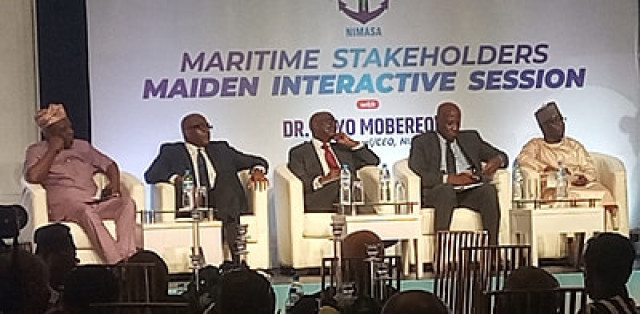The industry wants to see that affairs of the sector are effectively managed to ensure safe and clean waters, security, organization and to facilitate business in the industry.
The Ministry of Marine and Blue Economy, and the Nigerian Maritime Administration and Safety Agency, NIMASA, have been urged to expedite the disbursement of the Cabotage Vessel Financing Fund, CVFF, to the stakeholders in the nation’s Maritime industry.
Maritime lawyer, Emeka Akabogu, made the call during the maiden interactive session with maritime stakeholders in Lagos, yesterday.
Akabogu noted that the local shipping industry is losing over $1 trillion to foreign players due to the non-disbursement of the Cabotage Vessel Financing Fund, CVFF.
He emphasized that the non-disbursement of the Cabotage Vessel Financing Fund, CVFF, is depriving the maritime industry in Nigeria of N7 trillion in revenue, annually.
Akabogu, who was the guest speaker at the event, said
that the country’s maritime sector is potentially the largest economic sector outside of oil and gas and can generate N7 trillion annually.
Akabogu explained that stakeholders were of great expectations from both NIMASA and the Ministry of Marine and Blue Economy noting that it is only these expectations that will take the industry to the promised land.
He stated: "Expectations of the General Public: The citizenry is looking up to the Marine and Blue economy sector to be efficient in solving their daily problems, to create job opportunities that will bring gainful employment, and to create wealth and better the fortunes of the common man.
"In the context of our discussions here, this will be through those activities in the maritime value chain relevant to NIMASA that optimise efficiency, quick turn-around, safety, security and cost savings.
"Players in the industry also have expectations from NIMASA per its regulatory mandates, which are broadly two - maritime administration, and (shipping development and promotion.
"The industry wants to see that affairs of the sector are effectively managed to ensure safe and clean waters, security, organization and to facilitate business in the industry. They want vessels regularly boarded and inspected with breaches identified and sanctioned, licenses readily issued upon satisfaction of requirements, pollution response timely with adequate availability of response equipment, maritime labour easily registered and deployed, international conventions dutifully reviewed, understood, argued on our terms, ratified and domesticated; wreck cleared; they want a ship register that is credible, accessible and efficient, and so much more.
"In terms of shipping development and promotion, what the industry wants here is straightforward, they want to purchase and operate ships with ease, have them employed and active, have cargo readily available for the ships; have market data and information readily available on their screens on the tap of a button, they want access to finance that is transparent, credible and reliable; they want legitimate vessel operations not to be clogged by the inexplicable rejection of classification regimes already approved by the government, they want shipyards that are functional so they don’t go outside our shores for reliable dry-docking, and so much more; they want a system of cabotage waivers or licenses that is transparent and all-inclusive, they want CVFF and many more.
"Taken together, these constitute the promised land upon which voyage MV Maritime Nigeria has been set on course," he said.
Akabogu said that one of the principal mandates of the Nigerian Maritime Administration and Safety Agency, NIMASA is to develop and implement policies and programmes that will facilitate the growth of local shipping capacities.




















